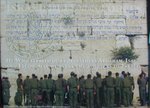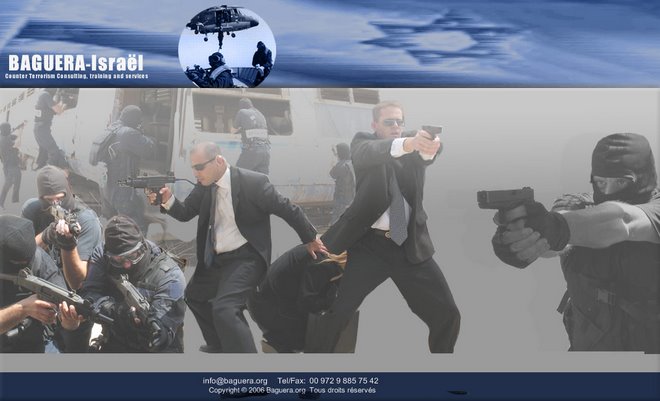Set Your Watch with B'nai Elim Jerusalem Time
Jerusalem On Line - Channel 2 News from Israel
UN Doomsday Treaty With Ginny Simone
07 February 2008
THE IRANIAN-ISRAELI STRATEGIC RELATIONSHIP
February 2008
DETERRENCE, MISSILE DEFENSE, AND COLLATERAL DAMAGE
IN THE IRANIAN-ISRAELI STRATEGIC RELATIONSHIP
Dr. W. Andrew Terrill
Strategic Studies Institute
One of the central concerns of U.S. strategic analysts examining the Middle East is the danger that Iran may develop a nuclear weapons capability which it could use to threaten the security of other regional states. These fears exist despite the recent declassification of a 2007 National Intelligence Estimate (NIE) “key judgments” summary suggesting that the Iranian nuclear weapons development program was frozen in 2003.
The NIE also states that technical problems have handicapped Iran’s ongoing nuclear enrichment effort under which natural uranium is processed into feedstock and then “enriched” for use as reactor fuel (peaceful use when used only for nuclear energy) or “highly enriched” for use in nuclear weapons. These conclusions by the U.S. intelligence community about the restraints and setbacks in the Iranian program are extremely good news, but they are not the whole story.
Unfortunately, the entire history of the Iranian program, including previous efforts to keep the enrichment effort secret, suggests that Tehran will almost certainly continue to seek a nuclear weapons capability despite the reassuring factors noted in the NIE.
Moreover, Iran’s continuing focus on nuclear enrichment is particularly disturbing since the development of a large-scale enrichment capability is the most technologically challenging aspect of the effort to build a nuclear weapon (despite the alternative uses of this technology for peaceful purposes). The questions, therefore, arise as to how dangerous will a nuclear Iran be and what will be the primary targets for Iranian nuclear weapons should Tehran obtain such a capability?
Moreover, in view of the incendiary rhetoric of Iranian President Ahmadinejad, it appears reasonable to wonder if there is a serious danger that Iran will attack Israel with nuclear weapons during some future period of Israeli-Iranian tension (such as may emerge out of a new Lebanon war). A related question that has sometimes been raised is should the United States at some point consider attacking Iranian nuclear sites before Iran becomes a nuclear power and this scenario can play itself out?
A future Iranian attack on Israel during a time of crisis is at least a remote possibility, but it is also subject to a variety of important problems that must be examined when considering the strategic viability of such an option for Tehran. Iran has both ideological and practical constraints that, under current conditions, would rule out such strikes in all but the most extreme circumstances.
These constraints are (1) collateral damage that might kill staggeringly large numbers of Palestinians and might also significantly harm the populations of a variety of Arab/Muslim states bordering on Israel, (2) deterrence by Israeli strategic forces which may be called upon to engage in massive retaliation for an Iranian strike, and (3) Israel’s strong and expanding system of missile defense and to a lesser extent its civil defense system consisting of underground shelters and other facilities for population protection.
Additionally, some leaders in Tehran might be concerned that any attack on Israel risks harm to Jerusalem, the third holiest city in Islam. The issue of Palestinian collateral damage is one of the most important political and ideological issues facing Iranian strategists, although it is seldom mentioned in current U.S. discussions of Iranian options.
It is not possible to attack Israel with nuclear weapons without also subjecting large numbers of nearby Palestinians and Israeli Arabs to the radioactive fallout associated with such an attack. The lethal range of such fallout is difficult to determine since it will depend upon a variety of factors including wind direction, type of explosion (groundburst versus airburst), and explosive yield.
Nevertheless, high lethality rates can easily reach 20 miles under many reasonable scenarios. Additionally, many communities of Israeli Arabs live quite near the Jewish population, while Palestinians on the West Bank and probably Gaza could also be subject to high doses of lethal fallout.
Unfortunately for the Palestinians, Iranian targeting accuracy for long-range missiles is not known and can reasonably be doubted due to ongoing and public problems that have been associated with Iran’s missile testing program. If Iranian missile accuracy is off even slightly, the Palestinians, Jordanians, Lebanese, or Syrians may pay a much higher price for an Iranian air strike than the Israelis.
Unlike Israel, none of the Arab countries has a modern civil defense system to shelter the population, let alone a missile defense program. While it is conceivable that Iran may under some circumstances accept the loss of huge numbers of Muslims and perhaps damage Jerusalem, such an action would not be entered upon lightly by Iranian leaders and is not consistent with the Iranian leader’s nonstop statements of concern about the Palestinians. It also does not appear consistent with what at least some Iranians claim are their obligations to God.
Deterrence by Israeli forces is the second problem facing Iranian strategic planners. The Israelis are widely believed to have significant numbers of deliverable nuclear weapons that they will use against Iran in any nuclear confrontation. While the details of this arsenal are subject to great Israeli secrecy, most Middle Easterners tend to believe that it is large and diverse, and deterrence is, of course, based on such perceptions.
Additionally, the Iranians are aware of the close relationship between the United States and Israel. Rightly or wrongly, many Iranian leaders may assume that an attack on Israel would also lead to U.S. military intervention against them.
This result, however, may not occur, and it may not be necessary for Israeli victory. A November 2007 study by Anthony Cordesman of the Center for Strategic and International Studies suggests that Israel may have the capability to destroy the Iranian nation-state without help from any other country, relying instead upon advantages that Israeli nuclear weapons have in accuracy and yield.
Iran, despite the zealotry and bombast of some of its leaders, has shown a consistent ability to conduct rational, national interest-based defense and foreign policies that would avoid deliberately provoking a nuclear war against their country.
Additionally, there is the issue of Israel’s expanding missile defense program, which is currently composed of the Israeli Arrow system and the most recent versions of the U.S.-produced Patriot system. In this regard, missile defense may be one of the most important guarantees of Israel’s future survival and security. Currently, the Israelis are seeking to expand their existing missile defenses into an elaborate and layered system of protection that could defend against any potential foe or array of foes.
According to the journal, Defense News, the Israelis are also undergoing a rigorous effort to test and improve their defensive systems using simulations of Iranian missile attacks. While there is probably no such thing as leak proof defense, the protection of a small country with limited targets is a much more achievable goal than protecting a larger country such as the United States.
Indeed, if a comprehensive and layered missile defense system cannot protect a small country like Israel from a technologically inferior rival such as Iran, it may be time to give up on the concept altogether. Moreover, the Israeli defensive system raises the possibility that an Iranian attack against Israel could fail to produce significant damage but could produce massive Israeli retaliation destroying the Islamic Republic while leaving Israel intact.
None of this is to say that the United States or Israel should become complacent about the Iranian nuclear program. Vigorous diplomacy, including an effort to strengthen multilateral sanctions in response to Iranian unwillingness to cooperate with the International Atomic Energy Agency, is fully warranted. A U.S. willingness to blame the Iranians publicly for any stonewalling in negotiations may also be essential to help expand international sanctions, but will only be effective if the United States carries out high level and serious negotiations in which we continuously consult with our allies.
Special efforts need to be made to include Gulf Arab states and especially Saudi Arabia in this campaign since the Gulf Cooperation Council states are also worried about Iranian nuclear weapons, albeit for different reasons than concern the Israelis. Conversely, U.S. preemptive military action against Iran seems deeply unwise and could produce tremendous difficulties for the United States in Iraq and huge difficulties for Israel in Lebanon and the Palestinian territories. Disruption in the oil sector could trigger a number of serious global economic consequences, including possible $200 a barrel prices.
Bombing raids against Iran could also breathe new life into Iran’s Islamist regime and savagely wound the already crippled Iranian reform movement. Such attacks may delay the Iranian nuclear program, but they will not stop it. Thus, it is important to weigh all of the relevant factors before we consider an attack.
Any reasonable consideration of the costs and benefits of such an attack suggests that Iran is a manageable problem that can be dealt with in ways other than using force. In fact, we may someday see a pro-American Tehran and look back with relief that we did not extend the reign of the Iranian clerics with an unnecessary attack, perhaps leading to an unnecessary war. **** The views expressed in this op-ed are those of the author and do not necessarily reflect the official policy or position of the Department of the Army, the Department of Defense, or the U.S. Government. This colloquium brief is cleared for public release; distribution is unlimited. *****
DETERRENCE, MISSILE DEFENSE, AND COLLATERAL DAMAGE
IN THE IRANIAN-ISRAELI STRATEGIC RELATIONSHIP
Dr. W. Andrew Terrill
Strategic Studies Institute
One of the central concerns of U.S. strategic analysts examining the Middle East is the danger that Iran may develop a nuclear weapons capability which it could use to threaten the security of other regional states. These fears exist despite the recent declassification of a 2007 National Intelligence Estimate (NIE) “key judgments” summary suggesting that the Iranian nuclear weapons development program was frozen in 2003.
The NIE also states that technical problems have handicapped Iran’s ongoing nuclear enrichment effort under which natural uranium is processed into feedstock and then “enriched” for use as reactor fuel (peaceful use when used only for nuclear energy) or “highly enriched” for use in nuclear weapons. These conclusions by the U.S. intelligence community about the restraints and setbacks in the Iranian program are extremely good news, but they are not the whole story.
Unfortunately, the entire history of the Iranian program, including previous efforts to keep the enrichment effort secret, suggests that Tehran will almost certainly continue to seek a nuclear weapons capability despite the reassuring factors noted in the NIE.
Moreover, Iran’s continuing focus on nuclear enrichment is particularly disturbing since the development of a large-scale enrichment capability is the most technologically challenging aspect of the effort to build a nuclear weapon (despite the alternative uses of this technology for peaceful purposes). The questions, therefore, arise as to how dangerous will a nuclear Iran be and what will be the primary targets for Iranian nuclear weapons should Tehran obtain such a capability?
Moreover, in view of the incendiary rhetoric of Iranian President Ahmadinejad, it appears reasonable to wonder if there is a serious danger that Iran will attack Israel with nuclear weapons during some future period of Israeli-Iranian tension (such as may emerge out of a new Lebanon war). A related question that has sometimes been raised is should the United States at some point consider attacking Iranian nuclear sites before Iran becomes a nuclear power and this scenario can play itself out?
A future Iranian attack on Israel during a time of crisis is at least a remote possibility, but it is also subject to a variety of important problems that must be examined when considering the strategic viability of such an option for Tehran. Iran has both ideological and practical constraints that, under current conditions, would rule out such strikes in all but the most extreme circumstances.
These constraints are (1) collateral damage that might kill staggeringly large numbers of Palestinians and might also significantly harm the populations of a variety of Arab/Muslim states bordering on Israel, (2) deterrence by Israeli strategic forces which may be called upon to engage in massive retaliation for an Iranian strike, and (3) Israel’s strong and expanding system of missile defense and to a lesser extent its civil defense system consisting of underground shelters and other facilities for population protection.
Additionally, some leaders in Tehran might be concerned that any attack on Israel risks harm to Jerusalem, the third holiest city in Islam. The issue of Palestinian collateral damage is one of the most important political and ideological issues facing Iranian strategists, although it is seldom mentioned in current U.S. discussions of Iranian options.
It is not possible to attack Israel with nuclear weapons without also subjecting large numbers of nearby Palestinians and Israeli Arabs to the radioactive fallout associated with such an attack. The lethal range of such fallout is difficult to determine since it will depend upon a variety of factors including wind direction, type of explosion (groundburst versus airburst), and explosive yield.
Nevertheless, high lethality rates can easily reach 20 miles under many reasonable scenarios. Additionally, many communities of Israeli Arabs live quite near the Jewish population, while Palestinians on the West Bank and probably Gaza could also be subject to high doses of lethal fallout.
Unfortunately for the Palestinians, Iranian targeting accuracy for long-range missiles is not known and can reasonably be doubted due to ongoing and public problems that have been associated with Iran’s missile testing program. If Iranian missile accuracy is off even slightly, the Palestinians, Jordanians, Lebanese, or Syrians may pay a much higher price for an Iranian air strike than the Israelis.
Unlike Israel, none of the Arab countries has a modern civil defense system to shelter the population, let alone a missile defense program. While it is conceivable that Iran may under some circumstances accept the loss of huge numbers of Muslims and perhaps damage Jerusalem, such an action would not be entered upon lightly by Iranian leaders and is not consistent with the Iranian leader’s nonstop statements of concern about the Palestinians. It also does not appear consistent with what at least some Iranians claim are their obligations to God.
Deterrence by Israeli forces is the second problem facing Iranian strategic planners. The Israelis are widely believed to have significant numbers of deliverable nuclear weapons that they will use against Iran in any nuclear confrontation. While the details of this arsenal are subject to great Israeli secrecy, most Middle Easterners tend to believe that it is large and diverse, and deterrence is, of course, based on such perceptions.
Additionally, the Iranians are aware of the close relationship between the United States and Israel. Rightly or wrongly, many Iranian leaders may assume that an attack on Israel would also lead to U.S. military intervention against them.
This result, however, may not occur, and it may not be necessary for Israeli victory. A November 2007 study by Anthony Cordesman of the Center for Strategic and International Studies suggests that Israel may have the capability to destroy the Iranian nation-state without help from any other country, relying instead upon advantages that Israeli nuclear weapons have in accuracy and yield.
Iran, despite the zealotry and bombast of some of its leaders, has shown a consistent ability to conduct rational, national interest-based defense and foreign policies that would avoid deliberately provoking a nuclear war against their country.
Additionally, there is the issue of Israel’s expanding missile defense program, which is currently composed of the Israeli Arrow system and the most recent versions of the U.S.-produced Patriot system. In this regard, missile defense may be one of the most important guarantees of Israel’s future survival and security. Currently, the Israelis are seeking to expand their existing missile defenses into an elaborate and layered system of protection that could defend against any potential foe or array of foes.
According to the journal, Defense News, the Israelis are also undergoing a rigorous effort to test and improve their defensive systems using simulations of Iranian missile attacks. While there is probably no such thing as leak proof defense, the protection of a small country with limited targets is a much more achievable goal than protecting a larger country such as the United States.
Indeed, if a comprehensive and layered missile defense system cannot protect a small country like Israel from a technologically inferior rival such as Iran, it may be time to give up on the concept altogether. Moreover, the Israeli defensive system raises the possibility that an Iranian attack against Israel could fail to produce significant damage but could produce massive Israeli retaliation destroying the Islamic Republic while leaving Israel intact.
None of this is to say that the United States or Israel should become complacent about the Iranian nuclear program. Vigorous diplomacy, including an effort to strengthen multilateral sanctions in response to Iranian unwillingness to cooperate with the International Atomic Energy Agency, is fully warranted. A U.S. willingness to blame the Iranians publicly for any stonewalling in negotiations may also be essential to help expand international sanctions, but will only be effective if the United States carries out high level and serious negotiations in which we continuously consult with our allies.
Special efforts need to be made to include Gulf Arab states and especially Saudi Arabia in this campaign since the Gulf Cooperation Council states are also worried about Iranian nuclear weapons, albeit for different reasons than concern the Israelis. Conversely, U.S. preemptive military action against Iran seems deeply unwise and could produce tremendous difficulties for the United States in Iraq and huge difficulties for Israel in Lebanon and the Palestinian territories. Disruption in the oil sector could trigger a number of serious global economic consequences, including possible $200 a barrel prices.
Bombing raids against Iran could also breathe new life into Iran’s Islamist regime and savagely wound the already crippled Iranian reform movement. Such attacks may delay the Iranian nuclear program, but they will not stop it. Thus, it is important to weigh all of the relevant factors before we consider an attack.
Any reasonable consideration of the costs and benefits of such an attack suggests that Iran is a manageable problem that can be dealt with in ways other than using force. In fact, we may someday see a pro-American Tehran and look back with relief that we did not extend the reign of the Iranian clerics with an unnecessary attack, perhaps leading to an unnecessary war. **** The views expressed in this op-ed are those of the author and do not necessarily reflect the official policy or position of the Department of the Army, the Department of Defense, or the U.S. Government. This colloquium brief is cleared for public release; distribution is unlimited. *****
Subscribe to:
Post Comments (Atom)
Colonel Richard Kemp, British Army - Comment on the IDF's Actions in Gaza
Radical Islams Plans for Western Civilization
THE THIRD JIHAD - WATCH THIS IMPORTANT FILM NOW - FREE
Obama's true agenda...Throw Israel Under the Bus
****Regarding Obama’s Speech before the U.N. Obama has surpassed the peanut farmer Jimmy Carter as the worst and most anti-Israel, anti-Semitic, Arabist President who has ever occupied the White House. Not only is he is a narcissistic moron who is dragging America into an abyss; Obama is the most dangerous threat to World Freedom, Liberty and Western Civilization since Hitler. (Blogmaster)
Senator Joe Leiberman 'Islamist Extremist Regime'
JOHN VOIGHT ON OBAMA'S DISTAIN FOR ISRAEL
CHAZAK CHAZAK
ON THE PATH TO MUSLIM DOMINATION - REVERSABLE? STOPPABLE?
2 STATE SOLUTION - COMMENTARY BY THE "18"
A message to the Jewish people and the entire world
Chronicles I - 16:15-18: "Forever remember His covenant that he commanded forever; That He made with Abraham and swore to Isaac; and confirmed in a decree for Jacob, for Israel, as an eternal covenant; saying to You I will give the Land of Cannan as your alloted heritage"
































 While doing IDF (Israel Defence Forces) reserve duty on a mountain overlooking the
While doing IDF (Israel Defence Forces) reserve duty on a mountain overlooking the 





No comments:
Post a Comment